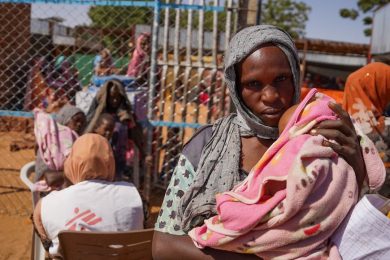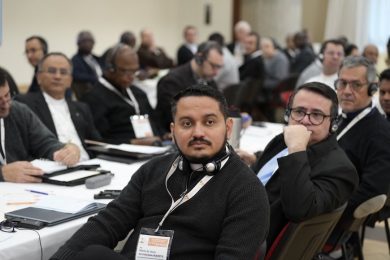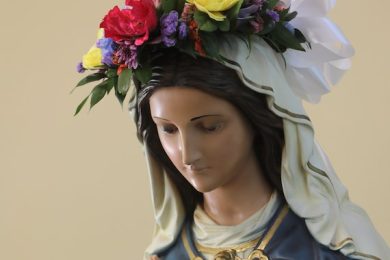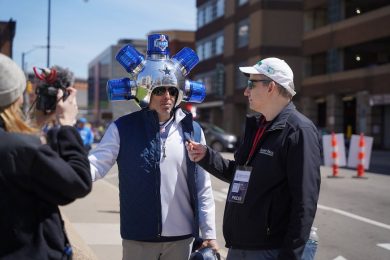John Wocken was ordained to the permanent diaconate in 2011. Deacon John serves St. Mary’s Cathedral, St. Augustine and St. John Cantius parishes in St. Cloud. He is retiring this year from teaching after 31 years, most recently as a second-grade teacher at St. Katharine Drexel School in St. Cloud. Deacon John and his wife, Laura, have four adult children and seven grandchildren. He is a member of the local National Eucharistic Revival core team and will be a speaker at the St. Cloud Diocese’s kick-off event for the revival June 18 at St. Mary’s Cathedral. The following interview was edited for length and clarity.
Talk about your spiritual journey and how you eventually discerned a call to the diaconate.
Deacon John: I attended St. Mary’s Cathedral Elementary School as a youngster. I remember going to Sunday Mass with my father after delivering papers in the morning. I’d listen to the homilies and wonder, “How do I apply this to my life? They don’t tell me anything about how to do that.” When the Second Vatican Council came with its reforms, as a young elementary school student I was really quite confused by all the changes. I eventually stepped away from the Church, probably in junior high school, and then throughout high school and college.

It wasn’t until I was a junior or senior in college that Father Robert Voigt, who had been in contact with me, asked me to consider going to a prayer group. I thought that’s not for me. But he said, “Well, why don’t you give it a try? Give it about six tries and then decide if it’s for you or not.” At that time, I finished college and was wondering what to do with my life. Where was my life going?
So I took Father Voigt’s advice and joined the Holy Angels prayer group that my brother attended in St. Cloud. I lost track somewhere along the way of the number of times I attended. I thought maybe God was telling me something about where I needed to be.
I stayed with the prayer group for several years and went through the charismatic renewal in the ‘80s and ‘90s. And I found my way back into the Church. I became active again at the cathedral in all of the various ministries. I really felt led to it. I found the liturgy to be beautiful. I liked the music. I liked the words of the Eucharistic Prayers. It really touched me. The Mass has always been food for me.
After a while, I thought I’d like to serve as a deacon. It was a time when the diocese was just starting to reinstitute the diaconate program. I talked with the bishop and he reminded me that if I wanted to get married and have a family, I needed to do that first because I wouldn’t be able to do it after I was ordained. So Laura and I were married in 1983 and started raising a family shortly after. The call to the diaconate kept coming back to me and stayed with me for probably over 25 years. I became a deacon 11 years ago.
What has some of your ministry entailed?
Deacon John: As part of my ministry in my Area Catholic Community, I work with families who want to baptize their first-borns. I lead the baptism formation. Many of the parents have said, “Maybe I should come back into the Church myself.” So it’s a good springboard for other sacramental preparation for them. Some of them decide to enroll in RCIA after that.
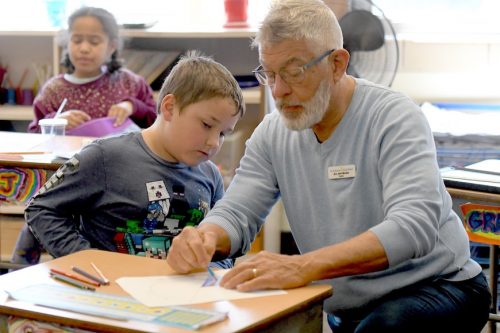
While I’ve been at the school, I’ve noticed that when I give Communion to the students at our student liturgies, there are some kids who cross themselves instead of receiving Communion — kids that might be fourth-, fifth- or sixth-graders. The school, of course, is open to all denominations, which could be one factor. But after sending a letter to some of the parents at the school, I asked if perhaps they had wanted to have their children baptized but never had gotten to it. And perhaps their hope is, since they’re in our parochial school, that their children would receive the Eucharist and the sacrament of reconciliation, too.
I would meet with those children for a couple of weeks just after school and help them understand what baptism is all about. Then I met with their families through my regular baptism preparation program. Eventually, we coordinated having children baptized at our school liturgies. We thought we should encourage them to do that in their parish communities, but oftentimes they really didn’t have a parish community that they felt part of. They felt more part of our school community. This year, we had five individuals who were baptized throughout the school year. They were all members of St. Augustine Parish and baptized during the parish’s regular weekend liturgies.
How does your ministry of service flow from, and connect to, the Eucharist. What does it call you to do?
Deacon John: I think it’s calling me to go out and preach the Gospel — to live it, model it, embody it in my daily life, in the raising of my family, in the education of the students in my school. The Eucharist is food on my journey. I tell the students, when I’m preparing them to receive the Eucharist, that when they bring the bread and the wine up as an offertory gift, that it’s not only the bread and the wine that will be changed and transformed, but it’s also themselves.
I tell them that the people who bring up the gifts represent the community coming to the altar and seeking to be changed. What we gain in a weekend liturgy is the food and the nourishment we need for the upcoming week. Then we come back repentant and asking for God’s mercy the next time we come to church. And, we try it again. That in our human weakness; we fall. And, yet, the Eucharist invites us to come back and seek God’s forgiveness, listen to his Word and go forth again.
What are your hopes locally for the upcoming National Eucharistic Revival?
Deacon John: I hope that people will be able to take the Eucharist and allow themselves to be more fully engaged in it. I hope that when everyone hears that they are to go out and proclaim the Gospel with their lives, that they feel compelled to do that. That through the Eucharist, people will feel empowered to live out the teachings, to live out the words of the Eucharistic Prayers and take it to the world, however they can do that — whether it’s praying for others or preaching to others or taking care of one another more effectively, more graciously, more generously. My hope is that this revival will spur that.




